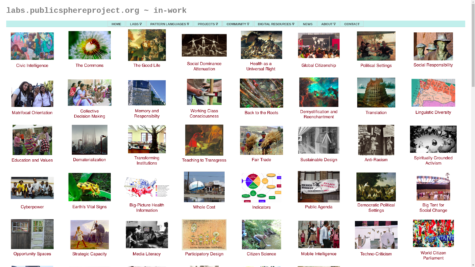Doug Schuler joined the monthly Systems Thinking Ontario meeting for a conversation about the potential for patterns and pattern languages to help address wicked problems on a large scale, via technology, loose coordination, and social commitments.
Doug was exposed to the original A Pattern Language in the mid-1970s. It aimed to generate towns and buildings that would be alive and life-affirming. That framework and perspective served to orient and structure collaboration under the auspices of Computer Professionals for Social Responsibility (CPSR). The Directions and Implications of Advanced Computing conference in 2001 attracted over 100 pattern proposals. These were ultimately transformed into the Liberating Voices pattern language containing 136 patterns by 75 authors. This body of work is available online and in a book published by MIT Press in 2008.
This pattern language addresses collaboration and civic intelligence, a critical under-developed resource necessary for democratic societies and public problem solving. Doug has led workshops in his teaching at the Evergreen State College, and with community groups designing actions and projects, around the world.
The video file is archived on the Internet Archive .
| Video | H.264 MP4 |
| April 12 (1h50m) |
[ (FHD 15936kbps 1.33GB) [on the Internet Archive] |
Audio playable onto mobile devices was transcoded to MP3 from the video.
| Audio | |
| April 12 (1h50m) |
[20210412_ST-ON_PatternLanguages.mp3] (40MB) [on the Internet Archive] |
Douglas Schuler is currently chair of ACM SIGCAS and president of the Public Sphere Project as a non-profit organization in the State of Washington. Doug is Professor Emeritus at The Evergreen State College, former Chair of Computer Professionals for Social Responsibility (CPSR), and a founding member of the Seattle Community Network (SCN).
This session was one in the Systems Thinking Ontario series where we have featured speakers from places far away from Toronto.



